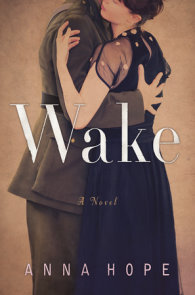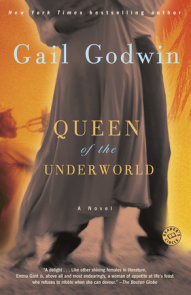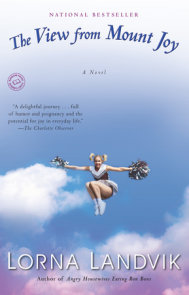READERS GUIDE
“Brilliant. . . . Beneath the women’s wigs and the men’s black fedoras, Mirvis finds reservoirs of belief, doubt, ambition, folly, lust, and the restof the human equation.” —The Washington Post Book World
The introduction, discussion questions, suggested reading list, and author biography that follow are intended to enhance your group’s reading of a new novel by Tova Mirvis, the bestselling author of The Ladies Auxiliary. The Outside World is a hilarious portrait of two Orthodox Jewish families brought together by marriage.
Introduction
Naomi and Joel Miller, who live a liberal Orthodox life in the suburbs of New Jersey, are unsettled when their son, Bryan, returns from a year at a yeshiva in Israel wearing a black hat and insisting that they call him by his Hebrew name, Baruch. He complains that the kitchen sink is not kosher enough, and he’s decided to defer his enrollment to Columbia University, because he wants to spend another year in Israel. Later, when he announces that he’s going to marry Tzippy Goldman, the daughter of Naomi’s college friend Shayna, his parents are even more disturbed. Joel can’t stand Tzippy’s father, Herschel, and the two families have grown apart over the years. Once the wedding takes place, Baruch agrees to run a kosher department in a grocery store—one of Herschel’s perennial moneymaking schemes—in the small Orthodox community of Memphis, Tennessee. Just as Baruch becomes proficient at running the business and begins to take pride in it, the business collapses, as Herschel continues to extend the empire of his dreams. The marriage of Tzippy and Baruch—as they establish their relationship and pull away from their respective parents—sends seismic rumblings through both households, and the remaining family members struggle to adapt to this new configuration of the family networks.Wise, funny, and wholly unforgettable, The Outside World is a story of isolation and assimilation, faith and doubt, destiny and true love—a fascinating glimpse into a closed community from a writer of singular wit and charm.
Questions and Topics for Discussion
1. How does Bryan/Baruch’s return from Israel change the life of the Miller family? What reactions does he provoke in his father and his sister? When one family member becomes a strict interpreter of the religion that the entire family practices, is he a tyrant or a reformer? Since he protested his mother’s plan to give a speech at his wedding, what might his reaction have been if his mother had decided to write a novel like The Outside World?
2. Why is Shayna obsessed with weddings? What does her family history and upbringing explain about her desperate need to belong to the Orthodox community? Why does she keep her non-Orthodox past a secret? Why does she succumb to depression later in the novel?
3. Who is the ideal or intended audience of this novel? Does it seem that Mirvis wants to create a view of this closed community for the outside world or show the Orthodox community a reflection of itself? How do the ideas she explores in the novel about belonging and not belonging, feeling trapped or stifled by one’s family, and the yearning for authentic spirituality move beyond the particular community that she describes?
4. All four people in the Miller family have different approaches to their religious life. How would you describe each one? How successful is Naomi in mediating among the members of her family? Why does she turn to ritual and celebration to heal her family’s differences when psychology fails?
5. When we meet Tzippy, she is simultaneously dreaming of rebellion against her mother and raging against her unmarried fate. As the novel ends, she is married and pregnant. She hasn’t stepped outside the role for which her family prepared her, but she has changed. How is she different, and what kind of experience has she gained? Does the novel suggest that she will live life on her own terms, within the parameters of Orthodoxy, and that she and Baruch will forge a better partnership than her own parents did?
6. Ilana, in questioning the restrictions of Orthodox family life, finds a potential ally in her father. Is the Miller family splitting in two, with Naomi and Baruch on one side, Joel and Ilana on the other? What aspects of the religious life does Ilana find most difficult to accept? Why is taking off her shirt in public such an outrageous act of rebellion? Why does she feel betrayed by her brother?
7. What impression does Mirvis give of the delicate matter of sexuality in the courtship of Orthodox couples? Once married, how do Baruch and Tzippy adjust to their new intimacy?
8. How does the novel show the distance between the women’s and men’s spheres of responsibility in the Orthodox community? Why are the ways of the household, cooking, and child-rearing so crucial to passing on the Orthodox way of life? What aspects of Orthodox life, as described in the novel, might present the most difficult challenges to an educated woman?
9. How does Mirvis evoke the special feeling of the Sabbath? What is the significance, for Joel, of arriving home late for Shabbos [pp. 223–24]? How does this event bring him and Ilana closer together? What is the significance, for Naomi, of Joel’s late arrival?
10. Why is Naomi driven to take such an active role in seeking meaning and answers in her life? What does she expect to find in books, meditation, and seminars on Jewish spirituality [pp. 229–33]? What is admirable about her as a character?
11. What are the challenges to children living in a society that is as insular as the community depicted in The Outside World? How are the children’s needs for independence or self-determination addressed? How does Mirvis make readers feel the communal pressure toward conformity? How much room is there for dissent or individuality?
12. Why has Mirvis chosen The Outside World as a title? What is “the outside world” for Orthodox Jews? How does the outside world figure in the novel? Which characters most strongly feel the lure or the pressure of the outside world?
13. At what points in the story does Mirvis’s compassion for her characters and her love of Jewish ritual come across most strongly?
14. Mirvis brings a good deal of humor to her writing. Which incidents, for you, were most amusing?
15. Does the ending of the novel suggest that Tzippy will take an active role in healing her own family’s troubles—her mother’s despondency, her father’s dangerously unrealistic dreams, her unguided little sisters? Or will she return to Memphis and take up her own family life, keeping a distance from her difficult parents?




















